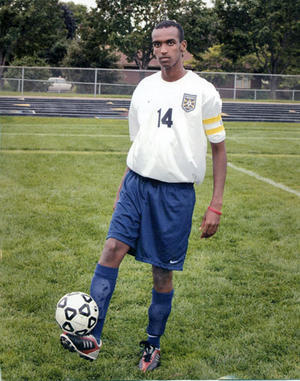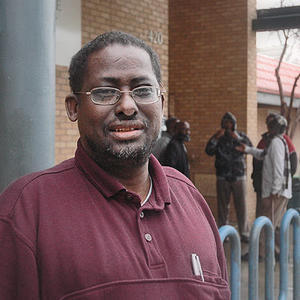They came to escape civil war, so why are they killing each other in the streets?

By Erin Carlyle
Tuesday, November 11, 2008
 |
| Augsburg College student Ahmednur Ali aspired to become president of Somalia one day, but instead his life was cut short. He was murdered after volunteering at Brian Coyle Community Center. |
After the fajr, the dawn prayer, Ahmednur Ali returned to bed, where he dozed until the last possible moment. Around 8:30 a.m., Asha heard her son rise again and ask his father for lunch money. Then Ahmednur left with his older sister, who drove him from their Columbia Heights home to Augsburg College, where he had just begun his third year as an international-relations major.
Ahmednur was only four years old when his family left Somalia in the fall of 1991. The family spent seven years in Cairo and then settled in Minnesota in 1998. Asha had chosen Cairo and Minnesota for the same reasons: Both locations were safe, and both offered the kids an education. Ahmednur impressed his siblings with his deep knowledge of Somalia and its history. He read incessantly, and not only spoke, but also wrote, Somali—quite an accomplishment for a young man educated in schools where his language was not taught.
At Augsburg, Ahmednur had a soccer scholarship and had founded the Muslim Student Association. The résumé he submitted for a work-study job at the Brian Coyle Community Center in Cedar-Riverside stated that his career objective was to work there. "He had a good reputation in the community and was an emerging leader," says Jennifer Blevins, director of the center. The young Somali-American had a specific political model in mind: Barack Obama
At first, Asha had not wanted Ahmednur to volunteer at Brian Coyle. There had been stabbings and shootings in the neighborhood, and Asha feared for his safety. But Asha's husband, Ahmed Ali Ulusow, a respected elder of the Twin Cities Somali community, thought his son should serve his people. Ahmednur had big ambitions: to work for the United Nations, and, ultimately, to become president of Somalia. He'd even set up a Facebook group for his campaign. "Somalia will be ruled by me in the upcoming years, so I might as well start campaigning now," he wrote on the group page. He promised to reunite the country and rid it of "qabil minds," a reference to the clan warfare that catapulted Somalia into civil war in 1991 and continues to tear it apart today. "Islam means peace," wrote Ahmednur, "and peace we will live in."
At Brian Coyle that day, Ahmednur helped the other kids finish their homework in the computer lab. As he was supervising little kids in the gym, 16-year-old Ramadan Abdi Shiekhosman came in, wanting to play basketball. Ahmednur told him to come back later, when the younger kids finished. Shiekhosman allegedly got angry, shoved him, and left.
At 5 p.m., Ahmednur finished his job at Brian Coyle for the day and walked into the sunny parking lot. According to the charges against him, Shiekhosman confronted Ahmednur, pulled out a dark-colored handgun, and struck him over the head. The young gunman fired one shot into the back of Ahmednur's head and then ran away.
 |
| Saeed Osman Fahia, the unofficial historian of Somalis in Minnesota, understands the social factors that have led to violence among Somali youth |
A young man tried to give Ahmednur CPR. Another called 911.
"Where is he shot?" the dispatcher asked.
"They think he's dead already," the caller said. "Um, I think in his head. Oh shit, he's bleeding out of his mouth some, all over."
The boy who wanted to be Barack Obama expired before the ambulance arrived. The man who had given Ahmednur CPR called Ahmednur's brother. The brother called his father, Ahmed, and told him that his son had been shot and killed.
Minutes later, Ahmed's phone rang. It was his wife, Asha. She had just completed asr, the third prayer of the day.
Ahmed told his wife that their son had been shot. But that is all he told her—he couldn't tell her over the phone that her beloved boy was dead.
Immediately, Asha began to pray. Her daughters frantically worked the phone, calling friends and hospitals for any scrap of information.
A neighbor came by in a blue Dodge van to take Asha to the hospital. The neighbor called Ahmed to ask where to go.
When she saw the neighbor's tears, Asha realized her son was dead.
"They never thought there would be gunfights here," explains Ahmednur's sister, translating for her mother, who speaks Somali. "Over there, every day somebody gets killed from a gunshot. They were expecting maybe in a car accident, or natural death, but not gangs."
AHMEDNUR FELL VICTIM to a pattern of violence that has left Minnesota Somalis confused, angered, and afraid: Five young Somalis have been murdered in the past 12 months.
1 2 3 4 5 Next Page »